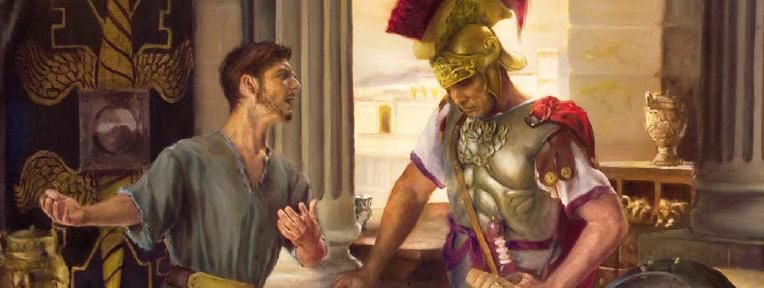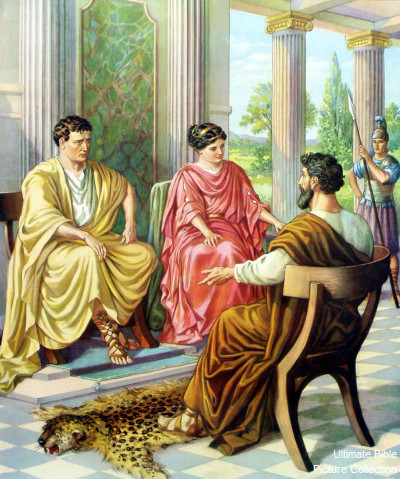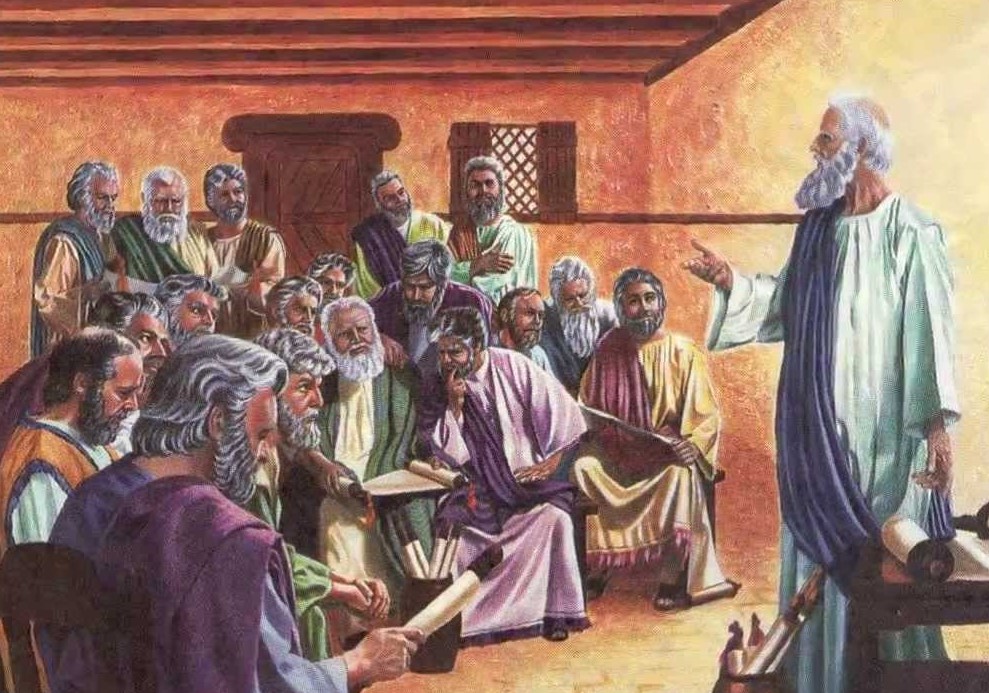Paul’s Third Missionary Journey: Revisiting Asia Minor and Greece (18:22–20:38)
Paul in Ephesus (19:1-22)
Paul leaves Apollos in Corinth and travels to Ephesus.
There he meets some disciples of John the Baptist who had apparently missed the part of his message about the baptism of the Holy Spirit and had only heard the part about the water baptism of repentance.
Paul reminds them of John’s words about the one who would come after him, Jesus, and the disciples believe and receive the Holy Spirit when Paul places his hands on them.
So these twelve disciples of John the Baptist became disciples of Jesus.
God did all kinds of miracles through Paul.
The text says that even handkerchiefs and aprons that Paul had touched were able to cure diseases and cast out demons.
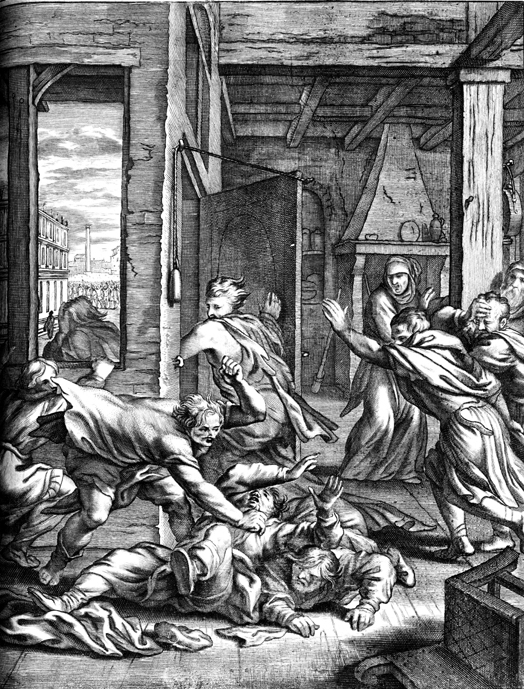 A group of Jews, seven sons of Sceva the priest were going around casting out demons, saying, “In the name of Jesus whom Paul preaches, I command you to come out.”
A group of Jews, seven sons of Sceva the priest were going around casting out demons, saying, “In the name of Jesus whom Paul preaches, I command you to come out.”
“One day the evil spirit answered them, ‘Jesus I know, and Paul I know about, but who are you?’ Then the man who had the evil spirit jumped on them and overpowered them all. He gave them such a beating that they ran out of the house naked and bleeding.”
The whole city was afraid because of this and they began to confess their sins, which included practicing sorcery.
The people brought out all of their magic scrolls and burned them. The value of the scrolls was the same as about 150 years’ worth of a man’s wages.
After nearly three years of training his disciples and teaching in the synagogues and outdoors in the lecture hall, Paul decided he was going to go back up to Jerusalem.
The Riot in Ephesus (19:23-41)
Around that time, a guy named Demetrius who crafted and sold idols in the city stirred up all the other craftsmen against Paul because the people weren’t buying their idols anymore.
He claimed, “There is danger not only that our trade will lose its good name, but also that the temple of the great goddess Artemis will be discredited.”
Soon the whole city was in an uproar.
The people seized Gaius and Aristarchus, Paul’s traveling companions from Macedonia, and all of them rushed into the theater together.
Paul wanted to appear before the crowd, but the disciples would not let him.
Even some of the officials of the province, friends of Paul, sent him a message begging him not to venture into the theater.
The assembly was in confusion: Some were shouting one thing, some another. Most of the people did not even know why they were there.
The Jews in the crowd pushed Alexander to the front, and they shouted instructions to him.
He motioned for silence in order to make a defense before the people.
But when they realized he was a Jew, they all shouted in unison for about two hours: “Great is Artemis of the Ephesians!”
The city clerk quieted the crowd and said, “Everybody already knows that Ephesus is the guardian of the temple of the great Artemis. Doesn’t everyone already know that her image fell from heaven? Calm down! You’ve brought these random fellows into the theater even though they haven’t done anything. If there’s any real issue, we have courtrooms for such things. As it is, we are in danger of being charged with rioting because of what happened today.”
He then dismissed the crowd.
Dr. Ray Vander Laan on the riot in Ephesus…
Watch 1:22 – 11:52
Through Macedonia and Greece (20:1-6)
Paul said goodbye to the disciples and set out for Macedonia.
He traveled through that area, speaking many words of encouragement to the people, and finally arrived in Greece, where he stayed three months.
Because some Jews had plotted against him just as he was about to sail for Syria, he decided to go back through Macedonia.
He was accompanied by Sopater, Aristarchus, Secundus, Gaius, Timothy, Tychicus, and Trophimus.
Paul stopped in Philippi along the way and caught up with the others at Troas later.
Eutychus Raised From the Dead at Troas (20:7-12)
Paul stayed with the believers for a week at Troas, and the night before he was to leave he kept talking and talking to the people until midnight.
Seated in a window was a young man named Eutychus, who was sinking into a deep sleep as Paul talked on and on.
Paul went down, threw himself on the young man and put his arms around him, saying, “Don’t be alarmed! He’s alive!”
Then he went upstairs again and broke bread and ate.
After talking until daylight, he left.
The people took the young man home alive and were greatly comforted.
Paul’s Farewell to the Ephesian Elders (20:13-38)
Paul and his companions set sail from the port of Assos and head to Mitylene, then Chios, then Samos, and then Miletus.
Paul had decided to sail past Ephesus to avoid spending time in the province of Asia, for he was in a hurry to reach Jerusalem, if possible, by the day of Pentecost.
Paul sends for the Ephesian elders, and when they arrive, he says his good-byes to them, and tells them that the Holy Spirit is leading him to Jerusalem, and that he doesn’t know what will happen to him there.
He blesses them and warns them to be on their guard against false teachers who will try to take over their group.
Everybody wept when Paul told them that they would never see his face again, and they walked with him down to the ship where he boarded and sailed away.
Paul’s Arrest in Jerusalem and Imprisonment in Caesarea (21:1–26:32)
On to Jerusalem (21:1-16)
They sail to Kos, then Rhodes, and then Patara, where they switch ships and sail all the way south of Cyprus and land in Tyre.
The disciples at Tyre urged Paul not to continue on to Jerusalem.
They all pray together on the beach, and then Paul and his companions set sail for Ptolemais, and then on to Caesarea.
There they stay with Philip the Evangelist, who was one of the original seven chosen by Jesus’ disciples to take their place in serving the Greek-speaking Jews.
Here the text mentions that Philip had four unmarried daughters who prophesied.
After several days, a prophet named Agabus comes down from Judea.
He takes Paul’s belt, ties his own hands and feet with it and says, “The Holy Spirit says, ‘In this way the Jewish leaders in Jerusalem will bind the owner of this belt and will hand him over to the Gentiles.’”
The believers then begged Paul not to go to Jerusalem, but Paul tells them to stop crying and breaking his heart, saying that he is willing not only to be bound but to die for Jesus.
And they set out for Jerusalem.
Paul’s Arrival at Jerusalem (21:17-26)
When they arrive, they go to see James and the other elders, and they report to them what God had been doing among the Gentiles.
The elders prays God, but then they inform Paul of a rumor going around that Paul denounces not only circumcision among Gentiles, but among Jews as well, telling them to throw out the Law of Moses.
And they let Paul know that there are four men among them who are waiting to finish participating in the Jewish purification rites, and they recommend that Paul accompany them and pay for their expenses so that the rumor that Paul is against the Laws of Moses will be put to rest.
And they add that they themselves have not forgotten the letter of encouragement they had previously sent to the Gentile believers, saying that they needed only to follow a small handful of laws intended for all of humanity, and not the special laws made specifically for the Jews.
And Paul went with the four men and paid for their purification rites.
Paul Arrested (21:27-36)
A week later, some Jews from the province of Asia saw Paul at the temple, and they stirred up the whole crowd and seized him, shouting, “Fellow Israelites, help us! This is the man who teaches everyone everywhere against our people and our law and this place. And besides, he has brought Greeks into the temple and defiled this holy place!”
They said this because they had previously seen Trophimus the Ephesian in the city with Paul and assumed that Paul had brought him into the temple.
The whole city was aroused, and the people came running from all directions.
While they were trying to kill him, news reached the commander of the Roman troops that the whole city of Jerusalem was in an uproar.
He at once took some officers and soldiers and ran down to the crowd.
When the rioters saw the commander and his soldiers, they stopped beating Paul.
The commander came up and arrested him and ordered him to be bound with two chains.
Then he asked who he was and what he had done.
Some in the crowd shouted one thing and some another, and since the commander could not get at the truth because of the uproar, he ordered that Paul be taken into the barracks.
When Paul reached the steps, the violence of the mob was so great he had to be carried by the soldiers.
The crowd that followed kept shouting, “Get rid of him!”
Paul Speaks to the Crowd (21:37–22:21)
As the soldiers were about to take Paul into the barracks, he asked the commander, “May I say something to you?”
The commander was surprised that Paul was speaking to him in Greek, and asked, “Aren’t you the Egyptian who started a revolt and led four thousand terrorists out into the wilderness some time ago?”
Paul answered, “I am a Jew, from Tarsus in Cilicia, a citizen of no ordinary city. Please let me speak to the people.”
After receiving the commander’s permission, Paul stood on the steps and motioned to the crowd.
When they were all silent, he spoke to them.
When they heard him speak to them in Aramaic, they became very quiet.
Then Paul said: “I am a Jew, born in Tarsus of Cilicia, but brought up in this city. I studied under Gamaliel and was thoroughly trained in the law of our ancestors. I was just as zealous for God as any of you are today. I persecuted the followers of this Way to their death, arresting both men and women and throwing them into prison, as the high priest and all the Council can themselves testify.”
He then goes on to tell them that while he was on his way to Damascus to arrest the followers of Jesus, Jesus himself appeared to him with a blinding light on the road, saying, “Saul! Why are you persecuting me?”
He told them how he had been blind, but had been healed, and how he had been baptized as a believer in Jesus.
He then tells the crowd how he had been given a message from God while in a trance at the Temple, telling him to leave Jerusalem because the people there would not believe his message.
And when he says that God had told him to go and deliver his message to the Gentiles, the crowd went into an uproar once again, shouting, “Rid the earth of him! He’s not fit to live!”
Paul the Roman Citizen (22:22-29)
As they were shouting and throwing off their cloaks and flinging dust into the air, the commander ordered that Paul be taken into the barracks.
 He directed that he be flogged and interrogated in order to find out why the people were shouting at him like this.
He directed that he be flogged and interrogated in order to find out why the people were shouting at him like this.
As they stretched him out to flog him, Paul said to the centurion standing there, “Is it legal for you to flog a Roman citizen who hasn’t even been found guilty?”
When the centurion heard this, he went to the commander and reported it.
The commander went to Paul and asked, “Tell me, are you a Roman citizen?”
“Yes, I am,” he answered.
Then the commander said, “I had to pay a lot of money for my citizenship.”
And Paul replies, “But I was born a citizen.”
Those who were about to interrogate him withdrew immediately.
The commander himself was alarmed when he realized that he had put Paul, a Roman citizen, in chains.
Paul Before the Sanhedrin (22:30–23:11)
The commander wanted to find out exactly why Paul was being accused by the Jews, so the next day he released him and ordered the chief priests and all the members of the Sanhedrin to assemble.
Then he brought Paul and had him stand before them.
Paul looked straight at the Sanhedrin and said, “My brothers, I have fulfilled my duty to God in all good conscience to this day.”
At this the high priest Ananias ordered those standing near Paul to strike him on the mouth.
Then Paul said to him, “God will strike you, you whitewashed wall! You sit there to judge me according to the law, yet you yourself violate the law by commanding that I be struck!”
Those who were standing near Paul said, “How dare you insult God’s high priest!”
Paul replied, “Brothers, I did not realize that he was the high priest; for it is written: ‘Do not speak evil about the ruler of your people.’”
Then Paul, knowing that some of them were Sadducees and the others Pharisees, decided to change the subject and play the parties against each other, and he called out in the Sanhedrin, “My brothers! I am a Pharisee, descended from Pharisees! I stand on trial because of the hope of the resurrection of the dead!”
When he said this, a dispute broke out between the Pharisees and the Sadducees, and the assembly was divided.
You see, the Sadducees say that there is no resurrection, and that there are neither angels nor spirits, but the Pharisees believe all these things.
There was a great uproar, and some of the teachers of the law who were Pharisees stood up and argued vigorously, saying, “We find nothing wrong with this man. What if a spirit or an angel has spoken to him?”
The dispute became so violent that the commander was afraid Paul would be torn to pieces by them.
He ordered the troops to go down and take him away from them by force and bring him into the barracks.
The following night the Lord stood near Paul and said, “Take courage! As you have testified about me in Jerusalem, so you must also testify in Rome.”
The Plot to Kill Paul (23:12-22)
The next morning more than forty Jews formed a conspiracy and bound themselves with an oath not to eat or drink until they had killed Paul.
And they plotted with the Sanhedrin to get the commander to have Paul brought in for more questioning so that they could intercept him and kill on the way.
But when the son of Paul’s sister heard of this plot, he went into the barracks and told Paul.
Then Paul had a centurion take his nephew to the commander to tell him what he had overheard.
The commander listened to the boy and warned him not to tell anyone about the report he had brought.
Paul Transferred to Caesarea (23:23-35)
The commander then calls together 470 soldiers and prepares to have them transfer Paul over to Caesarea that night to be kept under the care of Governor Felix.
And he wrote a letter to be delivered to the Governor, explaining why Paul was being delivered to him… with a few extra lines making himself look like a hero for saving Paul from those crazy Jews.
And Paul and the letter were delivered, but Governor Felix told Paul that he would wait to hear his testimony until his accusers arrived.
And he ordered that Paul be kept under guard in Herod’s palace.
Paul’s Trial Before Felix (24:1-27)
Five days later the high priest Ananias went down to Caesarea with some of the elders and a lawyer named Tertullus, and they brought their charges against Paul before the governor.
After flattering the Governor for awhile, they state:
“We have found this man to be a troublemaker, stirring up riots among the Jews all over the world. He is a ringleader of the Nazarene sect and even tried to desecrate the temple; so we seized him, and we would have judged him in accordance with our law. But the commander Lysias came and took him from us with much violence, ordering his accusers to come before you. By examining him yourself you will be able to learn the truth about all these charges we are bringing against him.”
Felix then lets Paul defend himself, and Paul says:
“I know that for a number of years you have been a judge over this nation; so I gladly make my defense. You can easily verify that no more than twelve days ago I went up to Jerusalem to worship. My accusers did not find me arguing with anyone at the temple, or stirring up a crowd in the synagogues or anywhere else in the city. And they cannot prove to you the charges they are now making against me. However, I admit that I worship the God of our ancestors as a follower of the Way, which they call a sect. I believe everything that is in accordance with the Law and that is written in the Prophets, and I have the same hope in God as these men themselves have, that there will be a resurrection of both the righteous and the wicked. So I strive always to keep my conscience clear before God and man.”
And Paul proclaims his innocence, but he does admit to the Governor that he did intentionally play some already angry Pharisees and Sadducees against each other by shouting about the resurrection.
Then Felix, who was well acquainted with the Way, adjourned the proceedings, saying that he would decide the case after commander Lysius arrived.
He ordered the centurion to keep Paul under guard but to give him some freedom and permit his friends to take care of his needs.
Several days later Felix came with his wife Drusilla, who was Jewish.
He sent for Paul and listened to him as he spoke about faith in Christ Jesus.
As Paul talked about righteousness, self-control and the judgment to come, Felix was afraid and said, “That’s enough for now! You may leave. When I find it convenient, I will send for you.”
At the same time he was hoping that Paul would offer him a bribe, so he sent for him frequently and talked with him.
When two years had passed, Felix was succeeded by Porcius Festus, but because Felix wanted to grant a favor to the Jews, he left Paul in prison.
Paul’s Trial Before Festus (25:1-12)
Three days into his new job, Festus went up to Jerusalem, and there the Jewish elders met up with him, making the request to have Paul transferred back to Jerusalem.
They were plotting to ambush Paul and kill him en route.
But Festus said there was no point in having Paul brought to Jerusalem since he himself was on his way back to Caesarea.
And he told the elders that if they wanted to press charges they needed to come to him.
About half a month or so later, the elders appeared before Festus in Caesarea and laid out their accusations against Paul, but they were unable to prove anything they said.
Then Paul made his defense: “I have done nothing wrong against the Jewish law or against the temple or against Caesar.”
Festus wanted to do a favor for the Jews, and he asked Paul, “Are you willing to go up to Jerusalem and stand trial before me there on these charges?”
Paul knows this is a trap and he calls everyone out, saying, “I’m standing in Caesar’s court right now. This is where I ought to be tried. I haven’t done anything wrong to these Jews. And if I were deserving of death, I would accept my punishment. But since these Jews are liars, I refuse to be handed over to them. I appeal my case to Caesar himself!”
After Festus had conferred with his council, he declared: “You have appealed to Caesar. To Caesar you will go!”
Festus Consults King Agrippa (25:13-22)
A few days later King Agrippa (aka Herod Agrippa I) and Bernice, his royal sister, arrived at Caesarea to pay their respects to Governor Festus.
Since they were spending many days there, Festus discussed Paul’s case with the king.
And Agrippa wanted to hear Paul for himself.
The next day, Festus had Paul brought in to speak with Agrippa and Bernice in front of an audience of nobles.
Paul tells Agrippa how pleased to is to have the king’s ear, since Agrippa was familiar with all of the Jewish customs and controversies.
He then goes on to tell the king the story of how he had been raised a Pharisee, and how this whole controversy he had found himself in was a debate on the idea of resurrection, which was not a new debate and nothing to freak out about.
The line about kicking against the goads is unique to this retelling of Paul’s conversion experience. It refers to a device that helps to keep an animal on a straight path instead of wandering off. Paul is comparing himself to a stubborn animal who ultimately finds it pointless to resist the guidance of his master.
Paul then says that he obeyed God and preached the Gospel message all over the Roman Empire, to both Jews and Gentiles, saying that what Moses and the prophets predicted had come true: “that the Messiah would suffer and, as the first to rise from the dead, would bring the message of light to his own people and to the Gentiles.”
At this point Festus interrupted Paul’s defense., shouting, “You’re out of your mind, Paul! Your great learning is driving you insane.”
And Paul tells the Governor that he is not insane and that he is only speaking of what is considered common knowledge among the Jews, and he says that King Agrippa understands what he’s talking about.
Paul then asks, “King Agrippa, do you believe the prophets? I know you do.”
Then Agrippa said to Paul, “Do you think that in such a short time you can persuade me to be a Christian?”
Paul replied, “Short time or long—I pray to God that not only you but all who are listening to me today may become what I am, except for these chains.”
The king rose, and with him the governor and Bernice and those sitting with them. After they left the room, they began saying to one another, “This man is not doing anything that deserves death or imprisonment.”
Agrippa said to Festus, “This man could have been set free if he had not appealed to Caesar.”
Paul’s Journey to Rome and His Preaching to Roman Jews (27:1–28:31)
Paul Sails for Rome (27:1-12)
Eventually, Paul and his companions are placed in the custody of a centurion named Julius, and, along with some other prisoners, are put aboard a ship headed to Italy.
They stop at Sidon, the Julius allows Paul to see his friends there, and his friends give him some supplies for his journey.
They put out to sea again and passed to the lee of Cyprus because the winds were against them.
When they had sailed across the open sea off the coast of Cilicia and Pamphylia, they landed at Myra in Lycia.
There the centurion found an Alexandrian ship sailing for Italy and put them on board.
They made slow headway for many days and had difficulty arriving off Cnidus.
When the wind did not allow them to hold their course, they sailed to the lee of Crete, opposite Salmone.
They moved along the coast with difficulty and came to a place called Fair Havens, near the town of Lasea.
Much time had been lost, and sailing had already become dangerous because by now it was after the Day of Atonement.
So Paul warned them, “Men, I can see that our voyage is going to be disastrous and bring great loss to ship and cargo, and to our own lives also.”
But the centurion, instead of listening to what Paul said, followed the advice of the pilot and of the owner of the ship.
Since the harbor was unsuitable to winter in, the majority decided that they should sail on, hoping to reach Phoenix and winter there.
The Storm (27:13-26)
When a gentle south wind began to blow, they saw their opportunity; so they weighed anchor and sailed along the shore of Crete.
Before very long, a wind of hurricane force, called the Northeaster, swept down from the island.
The ship was caught by the storm and could not head into the wind; so they gave way to it and were driven along.
As they passed to the lee of a small island called Cauda, they were hardly able to make the lifeboat secure, so the men hoisted it aboard.
Then they passed ropes under the ship itself to hold it together.
Because they were afraid they would run aground on the sandbars of Syrtis, they lowered the sea anchor and let the ship be driven along.
They took such a violent battering from the storm that the next day they began to throw the cargo overboard.
On the third day, they threw the ship’s tackle overboard, and when neither sun nor stars appeared for many days and the storm continued raging, they finally gave up all hope of being saved.
After they had gone a long time without food, Paul stood up before them and said:
“Men, you should have taken my advice not to sail from Crete; then you would have spared yourselves this damage and loss. But now I urge you to keep up your courage, because not one of you will be lost; only the ship will be destroyed. Last night an angel of the God to whom I belong and whom I serve stood beside me and said, ‘Do not be afraid, Paul. You must stand trial before Caesar; and God has graciously given you the lives of all who sail with you.’ So keep up your courage, men, for I have faith in God that it will happen just as he told me. Nevertheless, we must run aground on some island.”
The Shipwreck (27:27-44)
On the fourteenth night they were still being driven across the Adriatic Sea, when about midnight the sailors sensed they were approaching land.
They took soundings and found that the water was a hundred and twenty feet deep.
A short time later they took soundings again and found it was ninety feet deep.
Fearing that we would be dashed against the rocks, they dropped four anchors from the stern and prayed for daylight.
In an attempt to escape from the ship, the sailors let the lifeboat down into the sea, pretending they were going to lower some anchors from the bow.
Then Paul said to the centurion and the soldiers, “Unless these men stay with the ship, you cannot be saved.”
So the soldiers cut the ropes that held the lifeboat and let it drift away.
.jpg) Just before dawn Paul urged them all to eat: “For the last fourteen days, you have been in constant suspense and have gone without food—you haven’t eaten anything. Now I urge you to take some food. You need it to survive. Not one of you will lose a single hair from his head.”
Just before dawn Paul urged them all to eat: “For the last fourteen days, you have been in constant suspense and have gone without food—you haven’t eaten anything. Now I urge you to take some food. You need it to survive. Not one of you will lose a single hair from his head.”
After he said this, he took some bread and gave thanks to God in front of them all. Then he broke it and began to eat. They were all encouraged and ate some food themselves.
Altogether there were 276 people on board, and when they had eaten as much as they wanted, they lightened the ship by throwing the grain into the sea.
When daylight came, they did not recognize the land, but they saw a bay with a sandy beach, where they decided to run the ship aground if they could.
Cutting loose the anchors, they left them in the sea and at the same time untied the ropes that held the rudders. Then they hoisted the foresail to the wind and made for the beach.
But the ship struck a sandbar and ran aground. The bow stuck fast and would not move, and the stern was broken to pieces by the pounding of the surf.
But the centurion wanted to spare Paul’s life and kept them from carrying out their plan.
He ordered those who could swim to jump overboard first and get to land.
The rest were to get there on planks or on other pieces of the ship, and in this way everyone reached land safely.
Paul Ashore on Malta (28:1-10)
Once ashore, they learned that they had landed on an island called Malta.
The islanders were very kind to them and built them a fire because it was cold and raining.
Paul gathered a pile of brushwood and, as he put it on the fire, a viper, driven out by the heat, fastened itself on his hand.
When the islanders saw the snake hanging from his hand, they said to each other, “This man must be a murderer; for though he escaped from the sea, the goddess Justice has not allowed him to live.”
But Paul shook the snake off into the fire and suffered no ill effects.
The people expected him to swell up or suddenly fall dead; but after waiting a long time and seeing nothing unusual happen to him, they changed their minds and said he was a god.
There was an estate nearby that belonged to Publius, the chief official of the island.
He welcomed them to his home and showed them generous hospitality for three days.
His father was sick in bed, suffering from fever and dysentery.
Paul went in to see him and, after prayer, placed his hands on him and healed him.
When this had happened, the rest of the sick on the island came and were cured.
They honored Paul and his companions in many ways; and when they were ready to sail, they furnished them with the supplies they needed.
Paul’s Arrival at Rome (28:11-16)
After three months they put out to sea in a ship that had wintered in the island—it was an Alexandrian ship with the figurehead of the twin gods Castor and Pollux.
They put in at Syracuse and stayed there three days.
From there they set sail and arrived at Rhegium.
The next day the south wind came up, and on the following day they reached Puteoli, where they found some brothers and sisters who invited them to spend a week with them.
And so they came to Rome, and when the brothers and sisters there had heard that they were coming, they traveled as far as the Forum of Appius and the Three Taverns to meet them.
At the sight of these people Paul thanked God and was encouraged.
When they got to Rome, Paul was allowed to live by himself, with a soldier to guard him.
Paul Preaches at Rome Under Guard (28:17-31)
After three days in Rome, Paul called together the Jewish leaders and explained to them why he was there.
The Jews said that they had heard nothing about him, and that no one had sent them any kind of report, but they said they wanted to hear more about the sect Paul was apart of because they knew that everyone was talking bad about it.
So a crowd of Jews came to listen to Paul on another day, and he witnessed to them from morning till evening, explaining about the kingdom of God, and from the Law of Moses and from the Prophets he tried to persuade them about Jesus.
Some were convinced by what he said, but others would not believe.
They disagreed among themselves and began to leave after Paul had made this final statement: “The Holy Spirit spoke the truth to your ancestors when he said through Isaiah the prophet that ‘these people will be ever hearing but never understanding and ever seeing but never perceiving.’”
And he adds: “Therefore I want you to know that God’s salvation has been sent to the Gentiles, and they will listen!”
After he said this, the Jews left, arguing vigorously among themselves.
The Book of Acts ends with these words: “For two whole years Paul stayed there in his own rented house and welcomed all who came to see him. He proclaimed the kingdom of God and taught about the Lord Jesus Christ—with all boldness and without hindrance!”
The New Testament never says what happened to Paul, but we know that he continued to write letters to the different churches he had helped to start around the Roman Empire, some of which became books of the New Testament.
And according to Church tradition, Paul did finally stand trial before the Emperor Nero, who thought little of his case, and who eventually had Paul and many other Roman Christians beheaded after passing the blame onto them for the Great Fire of Rome.

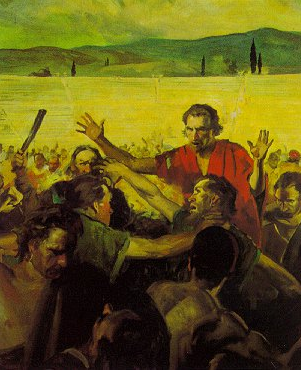
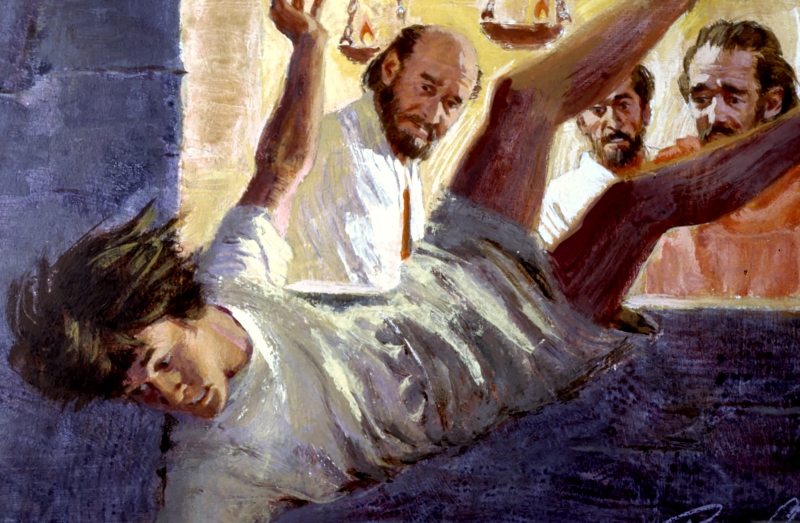

/images/scan0014.jpg)


